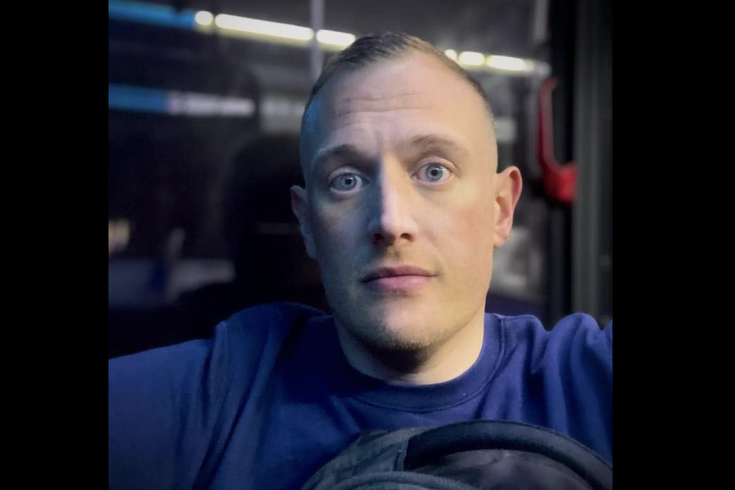
October 02, 2023
 joshkrugerPHL/Facebook
joshkrugerPHL/Facebook
Josh Kruger, a Philadelphia journalist and an advocate for the city's LGBTQ and homeless populations, was shot and killed at his home in Point Breeze early Monday by person who entered the property. Kruger, 39, was shot seven times in the chest and abdomen.
A journalist and former Philadelphia city employee was shot multiple times inside his Point Breeze home overnight and died shortly after at a hospital, police said Monday morning.
Josh Kruger, 39, was shot seven times in the chest and abdomen before 1:30 a.m. as he stood near the bottom the stairs inside his home on the 2300 block of Watkins Street. Philadelphia police said the shooter had entered Kruger's residence and fled after firing the shots.
Seriously wounded, Kruger exited the house seeking neighbors' help and collapsed in the street, police said. He was taken to Penn Presbyterian Hospital, where he died.
No weapons were found and no arrests have been made as of early Monday afternoon. There were no signs of forced entry, police said, and investigators have not publicly discussed possible motives for the shooting.
The Inquirer reported Monday that Kruger had posted to Facebook in September about a person who had entered his home, searching for their boyfriend. Kruger said the person identified themself as "Lady Diabla, the She-Devil of the Streets." On Monday, those details could not be found on posts to Kruger's Facebook page that were publicly viewable.
In an Aug. 29 post to Instagram, Kruger shared photos from a home security camera of a dark-colored Ram 1500 pickup truck and wrote that the driver had "sent a heavy glass egg (?!) projectile through my front window." He called it "seemingly a targeted act" and asked for help identifying the pickup's driver.
Kruger was an award-winning journalist who wrote for many publications in Philadelphia as a staff member and freelance writer, including PhillyVoice, the Inquirer, BillyPenn, WHYY, Philadelphia Magazine and others. He also spent five years as a spokesperson and content director for City Hall before he resumed his career as a journalist in 2021.
In December 2021, Kruger broke the news in an article for PhillyVoice about complaints among the staff of the city's Department of Commerce about its director, Michael Rashid. The article also detailed Rashid's history of inflammatory comments on social media and in person about religion. Rashid resigned days after the story was published.
Kruger's work focused on advocacy surrounding poverty and homelessness, LGBTQ rights, drug addiction, urban policy and the workings of city government. On his website, Kruger wrote that his critics viewed him as a "radical homosexual activist" who was known for incorporating his life experience into his work.
This year, he wrote for BillyPenn in May about the resignation of a member of the Philadelphia Police Department's LGBTQ Liaison Committee, whose longstanding role advancing these groups' voices had come into question at a time of increasing threats to the safety of LGBTQ people. Kruger also wrote for POZ magazine, a publication serving people living with HIV/AIDS, about his personal experience switching HIV treatments. And for Philadelphia Weekly, he wrote a story about the significance of state Rep. Malcolm Kenyatta's political ambitions as the first openly gay person of color in the Pennsylvania legislature.
Kruger also used his experience in city government to advocate for greater transparency and policy change. In January, writing for the Philadelphia Citizen, he argued that the city's approach to homelessness and opioid addiction in Kensington had become a series of failures masked by the excuse of the COVID-19 pandemic. Kruger had formerly played a key role in shaping the city's public messaging about its response to these problems while working in Mayor Jim Kenney's administration.
On Monday afternoon, Mayor Kenney posted on X, formerly Twitter, saying that he was "shocked and saddened" by Kruger's death.
"He cared deeply about our city and its residents, which was evident in his public service and writing," Kenney said. "Our administration was fortunate to call him a colleague, and our prayers are with everyone who knew him."
Kruger previously had written for the Citizen about his own period of homelessness more than a decade ago, when he was in the throes of drug addiction and had been sleeping near Rittenhouse Square.
"One of the worst parts of being homeless in urban America is feeling invisible," Kruger said. "When people don’t recognize your humanity, you begin to question it yourself."
On social media, Kruger sometimes shared details about his own experiences with homelessness, addiction and mental health that had informed his commentary as a writer. He frequently engaged in online debates about current events and issues impacting life in the city. In his personal life, Kruger was an avid cyclist and advocate for cat adoption.
Philadelphia District Attorney Larry Krasner said his office will work with Philadelphia police on the investigation into the shooting.
“Josh Kruger lifted up the most vulnerable and stigmatized people in our communities – particularly unhoused people living with addiction," Krasner said. "As an openly queer writer who wrote about his own journey surviving substance use disorder and homelessness, it was encouraging to see Josh join the Kenney administration as a spokesperson for the Office of Homeless Services. Josh deserved to write the ending of his personal story."
The D.A.'s LGBTQ Advisory Committee shared a statement praising Kruger's advocacy.
"LGBTQ+ Philadelphians experience violence of all kinds every day," the committee's statement said. "Few people used their platforms to remind powerful people in government of that reality as effectively as Josh Kruger did."
Police said the investigation into Kruger's shooting is ongoing.